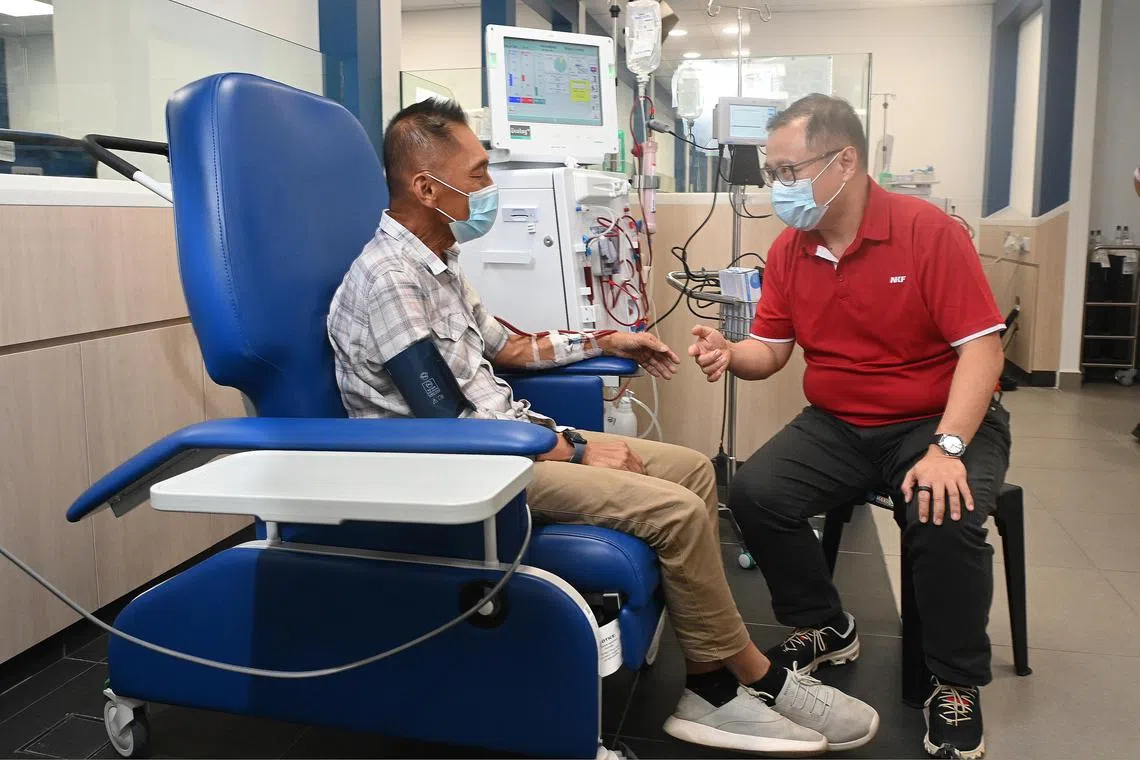NKF’s kidney disease screening programme at GPs aims to slow down ‘kidney tsunami’
Sign up now: Get ST's newsletters delivered to your inbox

National Kidney Foundation chairman Arthur Lang chatting with kidney dialysis patient Job Loei, 60, on Nov 25.
ST PHOTO: DESMOND WEE
SINGAPORE - More than 2,000 high-risk individuals have been screened for chronic kidney disease (CKD) at a GP clinic under a screening programme that started in March this year, and nearly 17 per cent of them were found to have abnormal kidney function and require further evaluation.
The National Kidney Foundation (NKF), which is behind the programme, has reached out to 175 general practitioners to offer high-risk patients a kidney disease marker, which consists of a blood test, and a urine test to detect albumin. It is covering the cost of these tests, which is at least $25.
The blood test measures the level of creatinine in the blood, which can build up if there is a problem with the kidneys, while the urine test detects albumin – a protein found in the blood – which could help signal kidney disease.
NKF, which has 5,700 dialysis patients or about 60 per cent of the total dialysis population in Singapore, aims to get more GPs onboard to help with early detection of CKD, even as it plans for more dialysis centres to meet rising demand, said its chairman Arthur Lang, 52.
In an exclusive interview with The Straits Times, Mr Lang said they are ramping up their preventative health strategy to stem the “kidney tsunami” here, with almost 900,000 people projected to have chronic kidney disease by 2035.
“We want to bend the curve, to see how we can slow down the kidney tsunami... and how we plan to do it is through increased awareness, prevention, and education,” he said.
Today, around 500,000 people in Singapore have chronic kidney disease, which puts them at higher risk of progressing towards kidney failure, also known as end-stage renal disease. This is a medical condition in which the kidneys can no longer adequately filter waste products from the blood.
About two in three new cases of kidney failure in Singapore are due to diabetes. Singapore ranks second in the world for diabetes-induced kidney failure, after Brunei and ahead of Malaysia, according to the 2023 United States Renal Data System annual report.
Since 2022, NKF has operated a CKD intervention clinic in Whampoa Road, where eligible high-risk individuals – such as those who have diabetes or hypertension, for instance – can make an appointment to get screened for CKD for free, said Mr Lang.
“(When) you come in, you can test for kidney disease, but you will also get dietary advice, you will be taught (some) exercises and kidney care – so it’s like a one-stop shop,” he said.
These early screening efforts are part of NKF’s two-engine strategy for combating the expected surge in CKD, with the first engine focused on doing what it can for today’s patients, and the second one aimed at preventative care and early intervention efforts.
Screening is key because people with kidney disease may not notice any symptoms until the disease is at an advanced stage.
One GP, Dr Colin Lim, who is onboard NKF’s GP screening programme, said he is looking out for patients between the ages of 21 and 80 with risk factors such a family history of kidney disease, diabetes or hypertension.
He said a new class of drug – sodium-glucose co-transporter 2 inhibitors – that helps to lower blood sugar and reduce the progression of kidney disease means that doctors can now do more for the patients they have screened.
Working with GPs to focus on early intervention is aligned with Healthier SG,
The impetus to go big on preventative care and early intervention is clear, given the projected number of 900,000 CKD patients. According to NKF’s calculations, they will need to run at least 70 to 80 dialysis centres by 2035.
Singapore now has 131 dialysis centres, including 42 NKF centres.
At the moment, all 42 NKF dialysis centres across Singapore are running at 92 per cent capacity, with slots set aside for emergency cases or patients who have to be isolated, such as those with hepatitis B virus infections.
With five new centres in the pipeline,
By 2030, the pool of dialysis patients here is projected to grow to 13,833, with 85 per cent on haemodialysis, which is done at dialysis centres, and around 65 per cent of them will be subsidised patients, NKF said.
NKF is Singapore’s biggest dialysis provider, where 75 per cent of its patients pay $50 or less per month after subsidies.
In the meantime, NKF is expanding its nocturnal dialysis programme, which allows patients to go through dialysis overnight to its Simei centre in early 2025. Currently, three centres – Hougang, Clementi and Woodlands – offer this service.



